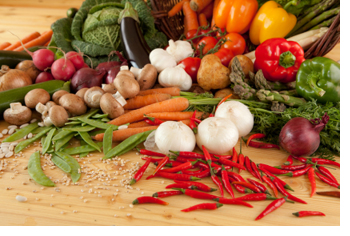 Organic foods are a hot topic these days, especially with the recent Stanford study suggesting that there’s no nutritional superiority. Is the organic food market all a hoax? Or is organic still the way to go? This article offers some food for thought.
Organic foods are a hot topic these days, especially with the recent Stanford study suggesting that there’s no nutritional superiority. Is the organic food market all a hoax? Or is organic still the way to go? This article offers some food for thought.
What Is Organic?
What is organic food? Generally, organic produce is grown without the use of chemical pesticides or toxic herbicides. Organic farms have strict regulations governing the growing process, including the use of fertilizers as well as other chemicals. Additionally, organic farms usually rotate crops regularly and undergo soil testing.
Animal products from animals and birds raised organically are required to have pasture feeding time or free space to move around. Organic farming requires more human work than conventional farming?after all, someone has to weed those rows of onions or beans if an herbicide isn’t doing the job!
Conversely, ?conventional? foods are those farmed in our typical North American style. Regular applications of herbicides and pesticides are used to control weeds and pests, chemical-based fertilizers and soil conditioners are common, and animals not required to have pasture space if It’s not available.
Is There Really Any Benefit?
There’s a constant debate over whether organic foods are more nutritious than conventionally grown foods. This not only refers to overall nutrient load, but also the presence and absence of certain nutrients. The 2012 Stanford study suggests that organic produce and conventional are equivalent in terms of nutritional benefits. But other studies have shown that because organic farming requires soil conditioning prior to crop growth, and since crops are rotated regularly, there is the potential for higher nutrient levels than in the conventional counterparts (where these mineral-saving strategies are not practiced as regularly).
What there is no debate about, however, is that organic foods contain significantly fewer pesticide and herbicide residues.
As crops grow, they pick up these contaminants from the soil and from direct contact (like spraying). This is, in turn, passed on to the consumer. These chemical residues are stored in our bodies? fatty tissues (including the brain).
Another benefit to organic farming is the environmental aspect. By avoiding pesticides and toxic herbicides, the organic farm is an eco-friendly system.
This not only means healthy air, but also healthy soil, ponds and streams, flora, and fauna, since pesticide residues can collect in soil and are passed down the food chain to the rest of the natural world.
Beware of Shams
Convinced that organic food is worth a try? It’s not always simple; at the grocery store, things can be confusing with all the ?natural,? ?organic,? and unlabelled products out there. Worse, not all allegedly ?organic? foods are truly grown in an organic manner. Look for the new organic certification label, released by the Canada Food Inspection Agency to help spot shams; these products are grown according to strict .standards. Be sure to check the labels on the food You’re considering purchasing, and make sure You’re paying for certified organic food.
Budget Shopping?
One frequently cited downside to organic food is that it is more costly. This makes sense; the production cost is higher due to the higher amount of human labour required; the cost is naturally passed on to the consumer.
If you have trouble fitting organic food into your budget, consider picking and choosing. The Environmental Working Group has created a ?dirty dozen? list that details foods with consistently high pesticide content (ranging from most to least contaminated): apples, celery, sweet peppers, peaches, strawberries, nectarines, grapes, spinach, lettuce, cucumbers, blueberries, and potatoes. The EWG recommends that these foods be purchased organic whenever possible.
Other potential budget-saving options include purchasing organic food directly from the farmer or growing your own vegetables in a backyard or balcony garden.
Whether or not to go organic is a personal choice that is often in large part dependent on the budget. But whether your food is conventional or organically grown, don’t forget to take time to respect it, enjoy it, and appreciate the work that a farmer put into growing it for you!
Katie D’Souza is an AU graduate and a licensed naturopathic doctor. She currently practices in Ontario.
Disclaimer: The information contained in this article is for personal interest only; it is not intended for diagnosis or treatment of any condition. Readers are always encouraged to seek the professional advice of a licensed physician or qualified health care practitioner for personal health or medical conditions.

